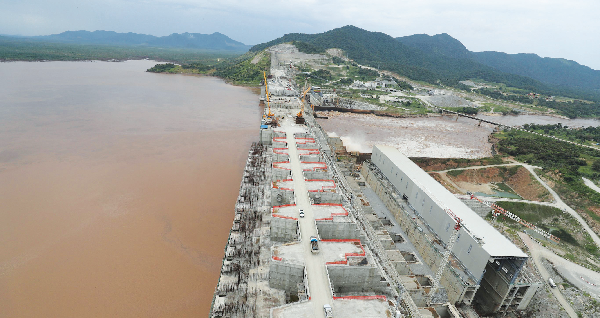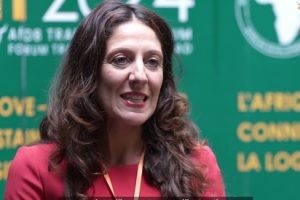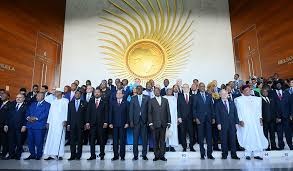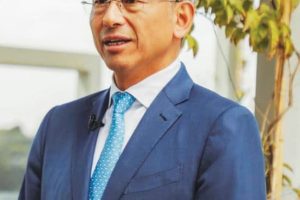
Construction still going strong despite formidable challenges
Although the COVID-19 emergency has stolen the show, the 9th anniversary of the launching of the Grand Ethiopian Renaissance Dam (GERD) was observed last week with a press conference by Dr. Engineer Seleshi Bekele, who once again outlined the opportunities and challenges and the prospects of construction of the dam that has been going on uninterruptedly for the last nine years. In the last ten years, the event was observed colorfully with cultural events taking place at the site of the dam and attended by thousands of people from all parts of the country and from all walks of life.
This year, the event was a low-key one while the press conference was a good opportunity for the government to reaffirm its determination to keep on working for the termination of the GERD project however formidable the challenges may be now and in the future. The three key countries in the GERD conflict, namely Egypt, Sudan and Ethiopia are also working hard to deal with the COVID-19 existential threat. The Washington mediation efforts are now kept on hold for obvious reasons.
However, Sudan has recently made it clear that the tripartite talks should be kept alive despite the difficulties and Ethiopia has kept its diplomatic doors open for any eventuality. Egypt often accuse Ethiopia of taking advantage of the political chaos created by the Arab Spring Revolution back in 2011 to launch the construction of one of the biggest dam in Africa if not in the world.
This accusation is pointless because it is objectively impossible to plan or base such a huge project on political conjecture. The idea of building a dam on the Nile on the Ethiopian side was floating around for a long time. It could not be implemented simply because the country had not sufficient resources for its realization.
It would rather be more realistic to assume that Ethiopia launched the project in the context of its status as one of the fastest economies in Africa and in the world and that energy was an indispensable input in its bid to make the growth sustainable by generating huge income from the sale of electricity in the Horn of Africa and beyond.
Thus it was not politics that inspired the construction of the dam but the requirements of economic growth. The name of the dam is itself revealing. The prospects of Ethiopia’s economic renaissance inspired the dam and not the other way round. Politics came into the picture not before but after the launching of the GERD. Whether there was the Arab Spring revolution or not, Ethiopia was simply determined to launch the GERD in order to come out of age-old poverty and famine. Even if Egypt were not involved in the 2011 domestic political chaos, Ethiopia was determined to go ahead with the dam. That is why it is not stopping to build the dam at this time when domestic and regional political and economic conditions were far from being suitable at this present juncture. The initial plan to complete the construction of the Great Ethiopian Renaissance Dam (GERD) was five years. That was an estimation based on the most optimistic scenario.
But things did not develop as planned as it is often the case in such huge enterprises .Politics interfered in the process and the GERD was forced to go through a period of reversal as the previous management proved inefficient, as well as corrupt. The mismanagement of resources incurred a high and unnecessary costs in terms of finance and precious time.
It took a certain time before the project could be put back on truck. Yet, soon after things returned to normal, the dam entered a new phase of accelerated work and has now reached more 70 per cent of completion level. In all this, Egypt was aware of the construction of the GERD but did not react until things went far and it could not reverse the process as it is sometimes claiming.
The Arab Spring revolution in Egypt had nothing to do with the GERD. It was a purely domestic affair and it was up to the Egyptians to chose their own priorities. Ethiopia’s priority was to build the dam and it sticking to it until now.
When the Egyptians started to take serious note of the GERD they were rather panicking because they had no clear policy and no time to work out a new one. Under the circumstance, they chose to stick to their old line of thinking looking at the GERD as an infringement of their sovereign rights on the Nile, a right that was wrongly articulated by British colonialists.
The successive regimes that took power in Cairo after the 2011 revolution displayed a high degree of confusion and issued contradictory statements on the GERD. It is to be recalled that the democratically elected government of Mohamed Morsi tried to exploit his Nile position, although erroneous to win over many followers on the side of his administration by pushing a highly nationalistic and classic colonialist position.
His successor, General Abdul Fatah Al Sisi who came on top of the political leadership after the coup, followed a somehow similar line of reasoning although he sometimes seesawed between a softer and harder approach to the GERD. At the end of the day however, both regimes embraced what they clearly or vaguely called Egypt inalienable rights on the Nile waters which amounts to saying that not a drop should be taken away from its share of the water that was allocated to it by the colonial era agreements.
In the midst of all this, Egypt’s position went on diverging rather than converging with that of the other riparian states and the recent Washington talks proved to be the straw that broke the camel’s back. This was alluded by Dr. Seleshi Bekele during his press conference when he said that the real intentions behind Egypt’s intransigence were becoming clearer now than ever and that Egypt was working hard to sabotage the dam construction by all available means. Now that the entire world is in the grips of the devastating pandemic, the chances that the Washington talks would pick up from where they were left is slim indeed. The US, Egypt, Ethiopia, Sudan and all the other countries are now busy fighting the spread of the virus.
They are forced to allocate their meager resources to this fight and they have no time left to turn their attention to the Nile controversy unless things improve fast. The economic and social fallouts of COVID-19 will be felt for a long time and the Trump administration is most likely to turn its full attention to the impact of the pandemic rather than to foreign issues.
The other parties to the talks will most likely work harder to contain the pandemic rather than meet now and then to disperse without tangible results or a semblance of agreement. However, it is the conviction of the Ethiopian people and their government to keep on fighting against the pandemic on the one hand and keep on building the GERD on the other hand unless and until unforeseen circumstances interfere to sabotage this twopronged strategy.
Even if construction on the GERD is halted due to fiscal constraints, which is something unlikely to happen at this stage, there is no way to stop works on the dam from proceeding simply because the people of Ethiopia would forego anything to see their dream project realized. Engineer Seleshi’s statements at the press conference reflect the popular optimism and are full of confidence in the future. According to him, almost 72 per cent of the dam is now completed.
Activities at the dam are being undertaken round the clock in two shifts. Despite the Corona virus attack, construction at the dam is proceeding as planned and every care is taken to protect workers from the virus. “We want to meet the increasing demands for energy at home and become the center of green and clean energy production in East Africa” Engineer Seleshi was quoted as saying during the press conference.
He thanked the Ethiopian people for the support they have brought to the GERD and asked them to do so in the future too because, as he said, the dam is not an ordinary dam like any other but a symbol of national unity and solidarity in the country. And when the talks will probably resume sometime in the future, Ethiopia’s commitment to the peace and prosperity of the Nile basin might rather enter a new chapter of cooperation rather than disagreement because many things will be changed by then, including Egypt’s intransigence and its overt and covert activities to undermine the collective dream of a hundred million plus people in this part of Africa who are determined to give everything to see their dream realized.
• In the past eight years, the GERD anniversaries were observed at the construction of the dam with colorful ceremonies and cultural events
• Press conference by Dr. Engineer Seleshi Bekele, minister of water resources gave a press conference last Thursday on April 4, 2020.
• Construction has reached 72.4 percent of completion
• Metal work has reached 20 per cent growth after reversal of
• All activities are going on with two shifts
• Despite Corona attack, work on the GERd is going on uninterruptedly
• Egypt has been relentlessly working to sabotage the GERD because it wants to use it only for itself
• Egypt’s intentions have become increasingly clear
• We want to meet the increasing demands for energy at home and become the center of green and clean energy production in East Africa
• He thanked the public for its uninterrupted support to the GERD
• He called on the public to keep on working for the objectives of the GERD
• The GERD has created national unity and solidarity.
The Ethiopian Herald April 12/2020
BY MULUGETA GUDETA





